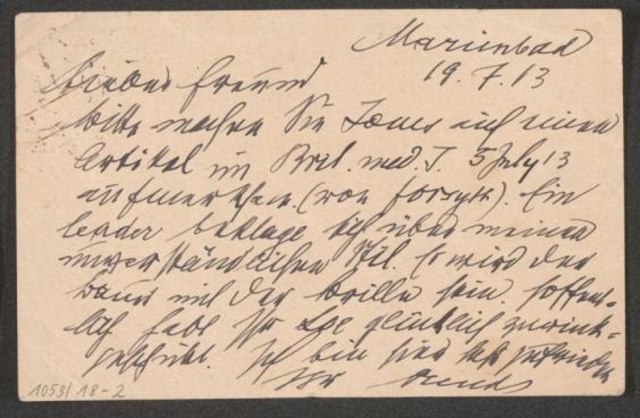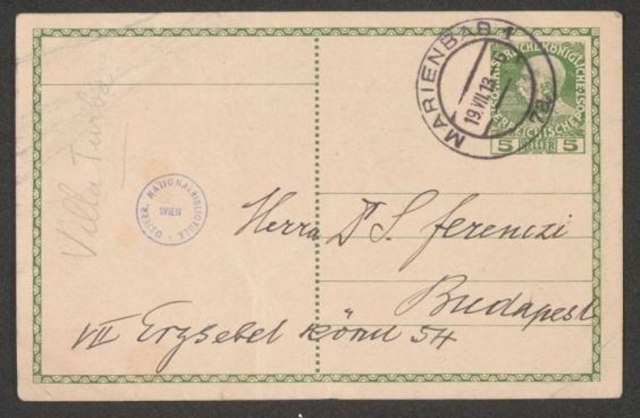-
S.
Marienbad
19.7.13
Lieber Freund
Bitte machen Sie Jones auf einen
Artikel im Brit. med. J. 5 July 13
aufmerksam (von Forsyth).1 Ein
leader beklage sich über meinen
unverständlichen Stil. Es wird der
Bauer mit der Brille sein.2 Hoffent-
lich habt Ihr Loe glücklich zurück-
geschickt. Ich bin hier sehr zufrieden.Ihr
FreudBR: David Forsyth, David (1913): Psychoanalysis. British Medical Journal, 5. Juli 1913, 2:13-17.
Besprechung zu diesem Artikel: Eder, M. D. (1913): Psychoanalysis. IZP, 1913 (1)6: 585
Freud, Sigmund (1933-001/1934): Neue Folge der Vorlesung zur Einführung in die Psychoanalyse. XXX. Vorlesung. Traum und Okkultismus. GS
Freud zitiert dort Forsyth (GS 12:199-206)
Forsyth (1877-1941)
Forsyth war Oberarzt am Charing Cross Hospital. (FE: Forsyth war übrigens im Charing Cross Hospital Jones vorgezogen worden, obwohl er in den medizinischen Prüfungen nach Jones nur Zweiter geworden war. Quelle: Brome, Jones, S. 36).
Forsyth veröffentlichte am 5. Juli 1913 einen Artikel über Psychoanalyse im British Medical Journal. Freud machte Jones über Ferenczi (F-FeSa/1913-07-19) darauf aufmerksam. Auf dem 17. Internationalen Kongreß für Medizin vom 7.-12. August 1913 in London Freuds Auffassungen und wurde eines der ersten Mitglieder der im Herbst 1913 von Ernest Jones gegründeten London Psychoanalytical Society.
Nach Ende des 1. Weltkrieges kam er für einige Monate zu Freud in Analyse nach Wien. Freud berichtete von einer Episode mit ihm 1933 in ›Neue Folge der Vorlesung zur Einführung in die Psychoanalyse.‹ (XXX. Vorlesung >Traum und Okkultismus‹.
Bei Forrester (2007) findet Forsyth an zwei Stellen Erwähnung. Die erste betrifft eine Diskussion, die im The Lancet zu einem Artikel von Forsyth geführt wurde:
"In early 1916, Jones had intervened in a debate in The Lancet provoked by a forthrightly psychoanalytic paper by David Forsyth, which had received a heavy pounding from the old guard psychiatrists reviving their pre- war dismissals of the Viennese doctrine just when they could perceive the tide amongst the RAMC doctors turning against them." (ibid:44)
Im Kapitel über die Rolle der BPS (British Psychological Society) bei der Gründung der British Psychoanalytical Society 1919: "At the BPS Extraordinary Annual General Meeting on 19 February, all went as planned: the meeting endorsed Myers’s plan, including the proposal that individual sections could nominate members who would become full members of the BPS. The very next day, 20 February 1919, as if awaiting the signal from these larger developments, Ernest Jones convened a group of nine at his lodgings at 69 Portland Court: Dr Douglas Bryan, Dr H. Devine, Mr J.C. Flügel, Dr D. Forsyth, Mr Eric Hiller, Miss Barbara Low, Dr Stanford Read and Dr W.H.B. Stoddart.5 The first act this group performed was to erase the detritus of the past:
Dr Jones . . . explained the objects of the meeting. He mentioned that about two [sic] years ago a Society called the London Psycho-Analytical Society had been formed, of which he had been the President. Owing to the fact that certain members of that Society had adopted views which were in contradiction to the principles of Psycho-Analysis the objects of that Society were negatived. As some members of the London Psycho-Analytical Society were present it was decided that the following resolution should be sent to the Secretary of that Society. Resolution that some members of the London Psycho-Analytical Society suggest that the Society exist no longer, unless any other members make a contrary suggestion. (Anon. 1920b)" (ibid:49)BR: (Siehe dazu: Ellenberger, Henry F. (1973): die Entdeckung des Unbewußten. Bern, Stuttgart, Wien: Huber. (Siehe Seite 1098)
BR: Forrester, John (2007): 1919: PSYCHOLOGY AND PSYCHOANALYSIS, CAMBRIDGE AND LONDON – MYERS, JONES AND MACCURDY. https://www.hps.cam.ac.uk/files/forrester-1919.pdf [2025-06-20]
Loe Kann war am 12. Juli von Wien nach Budapest gefahren (Brief von Ernest Jones an Freud vom 8.7.1913).
-
S.
Hlavní třída
Karlovarský kraj
Mariánské Lázně 35301
Tschechien
VII Erzsebét-kőrút 54
Budapest 1073
Ungarn
Autogr. 1053/18(1-7) HAN MAG


